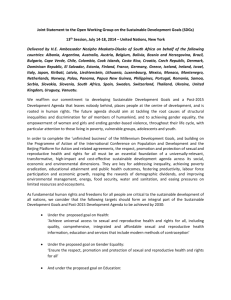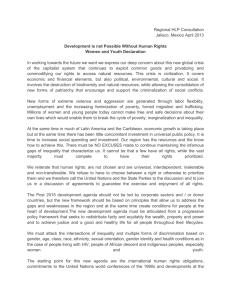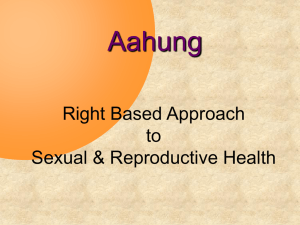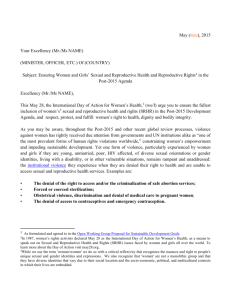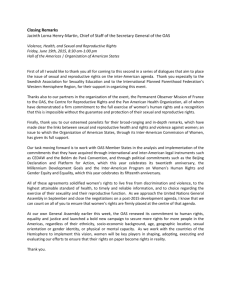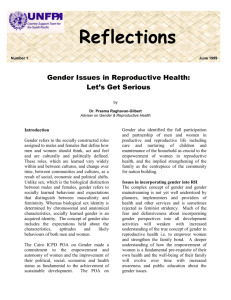Working Report on Bali HLP Gender Roundtable - Post
advertisement
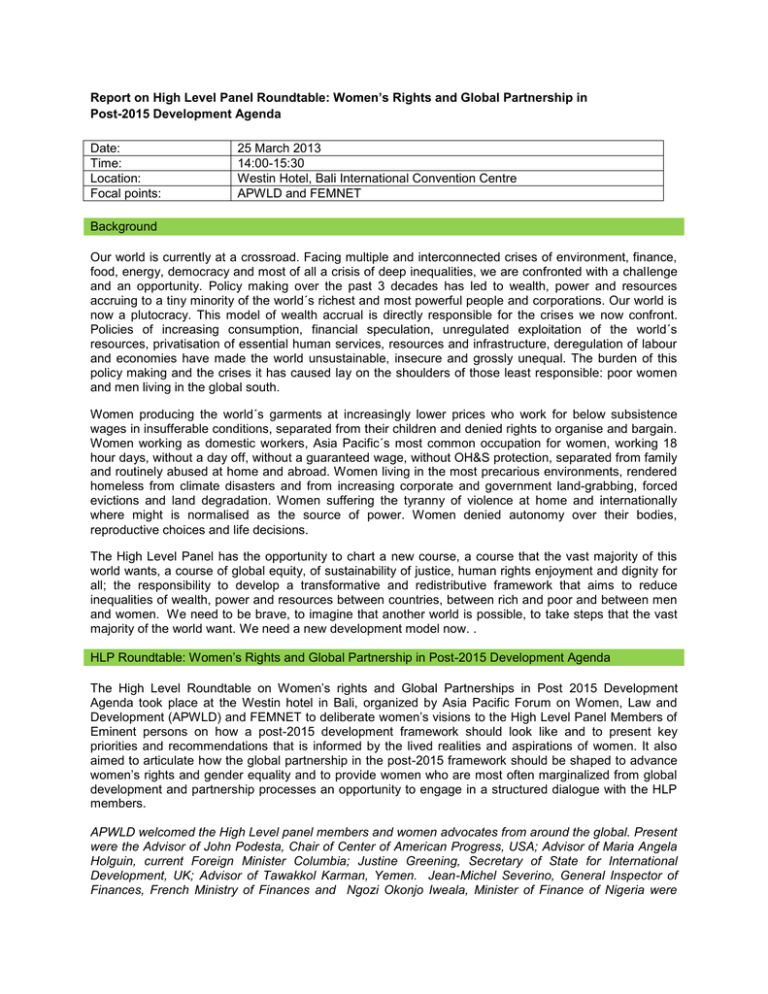
Report on High Level Panel Roundtable: Women’s Rights and Global Partnership in Post-2015 Development Agenda Date: Time: Location: Focal points: 25 March 2013 14:00-15:30 Westin Hotel, Bali International Convention Centre APWLD and FEMNET Background Our world is currently at a crossroad. Facing multiple and interconnected crises of environment, finance, food, energy, democracy and most of all a crisis of deep inequalities, we are confronted with a challenge and an opportunity. Policy making over the past 3 decades has led to wealth, power and resources accruing to a tiny minority of the world´s richest and most powerful people and corporations. Our world is now a plutocracy. This model of wealth accrual is directly responsible for the crises we now confront. Policies of increasing consumption, financial speculation, unregulated exploitation of the world´s resources, privatisation of essential human services, resources and infrastructure, deregulation of labour and economies have made the world unsustainable, insecure and grossly unequal. The burden of this policy making and the crises it has caused lay on the shoulders of those least responsible: poor women and men living in the global south. Women producing the world´s garments at increasingly lower prices who work for below subsistence wages in insufferable conditions, separated from their children and denied rights to organise and bargain. Women working as domestic workers, Asia Pacific´s most common occupation for women, working 18 hour days, without a day off, without a guaranteed wage, without OH&S protection, separated from family and routinely abused at home and abroad. Women living in the most precarious environments, rendered homeless from climate disasters and from increasing corporate and government land-grabbing, forced evictions and land degradation. Women suffering the tyranny of violence at home and internationally where might is normalised as the source of power. Women denied autonomy over their bodies, reproductive choices and life decisions. The High Level Panel has the opportunity to chart a new course, a course that the vast majority of this world wants, a course of global equity, of sustainability of justice, human rights enjoyment and dignity for all; the responsibility to develop a transformative and redistributive framework that aims to reduce inequalities of wealth, power and resources between countries, between rich and poor and between men and women. We need to be brave, to imagine that another world is possible, to take steps that the vast majority of the world want. We need a new development model now. . HLP Roundtable: Women’s Rights and Global Partnership in Post-2015 Development Agenda The High Level Roundtable on Women’s rights and Global Partnerships in Post 2015 Development Agenda took place at the Westin hotel in Bali, organized by Asia Pacific Forum on Women, Law and Development (APWLD) and FEMNET to deliberate women’s visions to the High Level Panel Members of Eminent persons on how a post-2015 development framework should look like and to present key priorities and recommendations that is informed by the lived realities and aspirations of women. It also aimed to articulate how the global partnership in the post-2015 framework should be shaped to advance women’s rights and gender equality and to provide women who are most often marginalized from global development and partnership processes an opportunity to engage in a structured dialogue with the HLP members. APWLD welcomed the High Level panel members and women advocates from around the global. Present were the Advisor of John Podesta, Chair of Center of American Progress, USA; Advisor of Maria Angela Holguin, current Foreign Minister Columbia; Justine Greening, Secretary of State for International Development, UK; Advisor of Tawakkol Karman, Yemen. Jean-Michel Severino, General Inspector of Finances, French Ministry of Finances and Ngozi Okonjo Iweala, Minister of Finance of Nigeria were absent. Among participants, John Hendra, Assistant Secretary-General for Policy and Programme at the United Nations Entity for Gender Equality and the Empowerment of Women (UN Women) also joined the session. a. Women’s Key Asks and Demands 6 (six) women speakers delivered presentation on women’s demands for women’s rights and global partnership in Post 2015 Development Agenda which were based from Women Caucus Statement on 4 th HLP Meeting. Access to Land and Resources – by Teresita Vistro, Asia Pacific Forum on Women, Law and Development (APWLD The situation of rural women is getting worse. The face of hunger and poverty continue to be that of women. UN World Food Programme states that women make up 60% of the world’s hungry people; that hunger is the world’s health risk, which kills more people each year that AIDS, malaria and tuberculosis combined. In Asia, of the 1.8 billion people living in poverty, 70% are women. There is an increasing body of evidence that show that women’s access to land and other resources for livelihood is a strong poverty eradication measure. When women gain economic power and gain control over this resource, this translates into stronger development outcomes for families and communities, such as decreased malnutrition in families, more funds going to education for children and increased food security. Added contribution are that there is greater maintenance and protection of biodiversity as women are able to maintain their roles of keeping their seeds and medicinal plants, and keep their sustainable farming practices. In many countries however, women’s claim to this important resource are hampered by customary laws and patriarchal views which dictate that men should own the land as they are the heads of households and responsible for feeding their families. Land grabbing further diminishes further land rights claims of women, and even is the cause of displacement of women from the land Recommendation: The new development goal should secure women’s access and control over land and other resources to make their lands productive such as water, energy, finance, education and markets. Proposed indicators: (1) the existence of country’s laws and policies that guarantee equal rights of women to own land, (2) where legislations on land rights exist, an indicator should measure the percentage of the land that is under the control of the women, and legislations should measure that women are protected against forces evictions and land grabbing, (3) As a way of developing these indicators, a participatory mechanism that legislated must be put in place. Through this mandated mechanism rural, indigenous women must be sufficiently and democratically consulted, their participation in the implementation, monitoring/evaluation of the results must be ensured and strengthened. Transformation of Global Structure by Wardarina, Asia Pacific Forum on Women, Law and Development (APWLD) The world needs a global architecture that has fairer distribution of wealth, power and resources, between countries, between rich and poor and between men and women. So far, the current architecture has done the opposite. Global policy making in this past 30 years, has one clear result; which is the accrued of wealth of tiny minority. It has stimulated economic growth by deregulating government, privatising public assets and encourages foreign direct investment. The current development model, which emphasizes global partnership has given the private sector a center place as a development actor. This central space has given even further power to not only the immensely powerful transnational corporations, but the international trade (WTO) and financial institutions (World Bank, ADB, etc) have even more clout in this ‘global partnership. Recommendation: New institutions are needed to transform the development and reduce inequalities. Institutions that are designed to be democratic, accountable to all people but particularly those most affected and whose accountability frameworks lie in human rights standards and obligations, and therefore set goals and target that require evidence of action, not symptomatic measures. Need to build goals that are establishing “economy that working for the people, not people working for the economy”, therefore need to firstly revisit the policy of deregulation, liberalization and privatization. To study and look into other forms of economies that are more democratic, and ensuring policies that protect and promote economies that are essential for the poor through universal social protection and universal access to free healthcare, education, energy, water and sanitation, ensuring decent work and living wage that can support a family to live in dignity. Need a global structure that allows women have control over their land and productive resources, and also a big percentage of arable land controlled and accessed by small land owner. We need a global structure where decisions was not being made in boardroom in Washington, but governments and development institutions must ensure that women, especially rural, indigenous and migrant women are not only present in the formal process, but also contribute their perspective and recommendations in decision making at all levels of development issues. This must be done through a bottom up, decentralized process, owned by people. Need to have a macro economic systems that acknowledge and value reproductive work, transformed macro economic policies would not aim to increase women´s ´productivity‘ without recognising the enormous productive contributions women already make. Recognising the value of reproductive work would also result in the recognition of domestic work as work. Governance and Accountability by Shannon Kowalski, International Women’s Health Coalition (IWHC) As women we look for governance that is based on human rights, justice, and the rule of law as well as the principles of equality and inclusion. We look for transparency of both information and processes, and accountability to people, and not for profits. We look for decision-making bodies that are inclusive and include proportionate representation of women, particularly in leadership roles. “good governance is not a one-way street, it requires an active and empowered civil society, including women's groups, that are engaged in decision-making, monitoring implementation, and demanding accountability at all levels”. We want to see all of these elements embedded into the post-2015 framework, because without them we are convinced that we will not be able to achieve the world that we as women want. Recommendation: Post-2015 framework must be fundamentally based on existing human rights legal norms, standards and political commitments. International human rights law, including the Convention on the Elimination of All Forms of Discrimination against Women, as well as related international consensus documents like Programme of Action of the International Conference on Population and Development and the Beijing Declaration and Platform for Action, must form its nonnegotiable base. These commitments provide us with a legal and normative framework for building just, healthy, equitable, resilient and sustainable societies Post-2015 framework be designed as a tool to empower women to monitor and hold governments, businesses, international institutions and other development actors to account. Need to provide accountability mechanisms from grassroots to the global, community monitoring tools, budget monitoring, shadow reports to provide input in monitoring mechanisms. At the national level, parliaments, judiciaries, and national human rights mechanisms should be empowered to oversee implementation and provide remedies where governments fall short. At the global level, the human rights architecture, including treaty bodies, special procedures including special rapporteurs, and the universal peer review mechanisms should also be used as tools for accountability. Post-2015 agenda must also include clear and time-bound commitments, with targets and indicators that measure quality as well as quantity and aim to address inequalities. The timely collection and disaggregation of data on the basis of all the grounds of discrimination and their intersectionality is essential to identify, make visible and respond to inequalities and violations of human rights and to increase accountability. Mechanisms for data collection and analysis for monitoring progress must be transparent and inclusive of input from women’s groups Transparency of information, including budgets, as well as of decision-making processes and mechanisms, should be a principle that underpins the post-2015 framework. We demand it not only from governments, but from other development actors. The thread that will hold all of this together is women's empowerment and transformative leadership at all levels. Parity of representation in decision-making bodies should be a key goal for the post-2015 framework. The importance of women’s movements must be recognized. We demand decision-making and accountability process that are truly democratic and incorporate the voices of the women who are most marginalized. Good governance starts at home with women able to make decisions over their own bodies, sexuality and lives. For that, we must at a minimum guarantee that women can fully exercise their sexual and reproductive rights, be economically independent, and ensure that they have a voice in decision-making. Only then will we accomplish the kind of transformative economic, social, political, cultural and ecological governance change that we need to achieve the world we want and the future of generations to come. Sexual and Reproductive Health, Gender Based Violence, Fundamentalism, Conflict and Peace by Irina Costache, ASTRA Network. The ending all forms of violence against women is indispensable to ensure that women are able to participate and benefit from development. “Without a commitment to ensure women’s physical security, bodily integrity and personal comfort, we cannot talk to women as active agents of development or of people-centered development”. VAW is an achievable goal with targets and indicators. The Commission on the Status of Women and its’ agreed conclusion on Violence against Women showed a global consensus on ending violence against women is possible, but the questions remains on how to further profit from the consensus and secure the very means to implement so that “ending violence against women” is not merely noble slogan, but becomes a concrete commitment for governments. Ending violence against women is a sound and basic first step towards promoting leadership of women at all levels and also a fundamental prerequisite for gender equality, sustainable development and genuine democracy. Recommendations: Ending all forms of violence against women, including intimate-partner violence and its intersections with HIV infection, as well as forms of violence enabled within public spaces and highlighted forced sterilizations, forced abortion in health care facilities and sexual violence in refugee camps among others as concrete issues that need to be addressed Ensure finance and accountability mechanism, such as committed public funds to make concrete steps toward eradication of VAW. Global Partnership discussion should lead into finding solutions for raising these funds, need to secure partnerships both at national and at regional levels, centered on women’s rights and in the interests of women. Ensuring women’s meaningful role in development is universal access to sexual and rep roductive health and the safeguarding of sexual and reproductive rights. Sexual and reproductive health and rights are central to human development and interlink to all key development agendas: equality, human rights, poverty, migration and population dynamics, food security and access to resources, health. Need to address the removal of all barriers (legal, social, economic) for women and teen girls to access sexual and reproductive health services including contraceptives, safe abortion, prevention and treatment of sexually transmitted infections and HIV, reproductive cancers and safe delivery. The sexual and reproductive rights of women must be safeguarded. Women must have the information and the means to decide independently when and how many children they want to have and once they do that, they should not risk their lives whenever they make such decisions. Rising costs of health care and essential drugs were highlighted. Public-private partnerships in the health sector and including pharmaceuticals /contraceptives/ARVs have to take into account that health is a universal right and a common good, one that raises ethical problems in relation to profit seeking. Sexual rights are fundamental human rights and within that acknowledgement we ask that laws and policies that discriminate on the basis of gender; criminalize or marginalize specific groups of women based on their sexual orientation, gender identity, participation in sex work, or other status be repealed; Rising populist politics and fundamentalisms have a way of focusing their politics over the control of women’s bodies and LGBTQI lives. Governments and supra-national institutions need to ensure and guarantee that all people have control over their private lives as individuals and that acts of discrimination (including in law) find redress in justice. The principle of non-discrimination is closely bound with the principle of equality that we hope to see imbedded in the post 2015 agenda and to those of human rights that drive all UN efforts Grassroots and Global Partnership by Caroline Usikpedo, National President (Niger Delta Women's Movement for Peace & Development), Co-Chair for the women’s major group. Grassroots women are the most affected on the impacts of climate change, environmental degradation and poverty, yet their voices are least heard and they are not seen when policies are being decided. She explained that many countries especially in Africa are off track in terms of achieving the MDG’s. “In 2000, there was relative stability, prosperity and coherence when western economies were on the rise and the conditions were good for forging agreements on global targets for development. From the 2005 Paris Declaration onwards, traditional aid donors and recipients had committed to work in partnerships, driven by policies and goals ‘owned’ by recipient countries. But traditional donors would not let go and ‘accountability’ often became the cover for continuing control, and many developing countries did not have the confidence and technical competencies to drive the agenda. The present MDGs were largely cooked up by donors. Their failure lies in their weak implementation and an outcome that sees the poor and vulnerable mostly women still left behind. The lack of consultation at its inception to build ownership led to the perception that it is a foreign and donor-centric agenda”. It is important to raise stakes to the knowledge of the grassroots women and create awareness among the women and the community leaders and to alert the international community of the several neglect exercised on the rural women in rural communities. In 2009 and 2011, Niger Delta Women’s movement for Peace and Development and the Gender and Climate Justice Hearings with rural women organized three Tribunals and Public Hearings on Women, Water, Poverty and Climate Change which feed into the final results presented at the Climate Forum 2009 in Copenhagen and in Durban respectively. The tribunal created the platform and opportunity to hear from the women on the impact of climate change and polluted farmlands on low crop yield and impoverishment; the lack of portable water, the pollution of and other relating to the activities of oil multi nationals which resulted in extermination of aquatic life and soil infertility. Recommendations New transformative new development framework that should put grassroots women at the center of defining, implementing, monitoring and evaluation of all development commitments and to create space for dialogue among multiple stakeholders including women and women’s movement, parliamentarians, trade unions and other social movements. Global goals, as well as contextualized national targets for countries aiming at a sustainable and equitable global development, as well as the eradication of extreme poverty must be included and based in full accordance with international human rights laws. The goals need a stronger focus on livelihoods for the grassroots /rural women; inequality; the environment; and resilience in face of disasters. The Framework should be holistic, accountable, inclusive, equitable and universally applicable, including being a demanding monitor of the new post-2015 development goals and indicators. Development of a Post 2015 Development Agenda should enable to allow grassroots women to negotiate for their own development priorities throughout this process. Financing for Development By Cai Yiping, Development Alternatives with Women for a New Era (DAWN) Yi Ping shared a story from her community showing the necessity to build development projects around human rights and women’s rights in a comprehensive and holistic manner. The story tells us about a woman living with HIV who was able to access treatment, but as a victim of domestic violence, her bruises on her face remained. The story shows that the new development framework must be embedded and based on human rights and the urgency to break down the silos that the MDGs have created. However, government programs are focused on targets and indicators and are less interested in cross sectorial approaches. For example, the current narrow focus on reduction of maternal mortality shows that governments ignore the serious range of difficulties during women’s sexual and reproductive years and lives, and neglect to provide access to the full range of services throughout the life cycle. Maternal mortality cannot be reduced without fully addressing sexual and reproductive health and rights. On global finance accountability and role of UN should play, she stressed that the process should not be driven by donors and private philanthropic foundations; and to look critically at bilateral trade agreements. The new development paradigm must reform and global macro-economic structures must be coherent with human rights obligations. Aside from the 6 women speakers, 5 participants from gender roundtable also raised some concerns and questions to the HLP members. Norma Maldonado from Guatemala raised the concern on green economy and their initiatives, which means death for women. Water sources are being destroyed and the current programs are not working as root causes are not addressed. The trade agreement is making it impossible for women to live healthy and quality lives. Atasbjah from Indonesian Planned Parenthood Association - stressed to retain the goal to improve safe motherhood (MDG5) and the target and indicators of Universal Access to Reproductive Health and access to contraceptives and family planning. These are indispensable building blocks for development. IPPF/WHR - inquired on what role can UN WOMEN play in making sure women s groups are taken into consideration when thinking about global partnerships for strengthening women’s movement? Irak CSO – expressed the concern that little has been done on women equality and VAW and that the UN has a great responsibility. Although resolutions are signed and ratified the resolutions, laws remain unchanged ADB/NGO Forum – indicates that systematic problems exist. One is the idea of global partnerships, privatization of agriculture and the solution of only giving a bandage. ADB only looks at primary impacts (compensation for displacement) but the root causes are not addressed. We need tangible asks for program accountability. Responses from HLP Members Advisor of John Podesta – responded that the HLP focuses on 3 aspects: ensuring political, social and economic participation throughout. When women are central to political and social process, changes occur. He stressed the need to be bold in this area and change is possible: “We have now quotas for political participation. It is not an admiration, it is now a norm.” From an economic perspective, focus on women access to credit (land issue) is important. The HLP are well aware of the issues; agriculture production will grow when women are in control. He refers to the Gender Empowerment Index that refers to this. He highlighted a best example of a program of the Philippines government is giving women entitlement to land. Country ownership must reflect voices of women: “Nothing about them, without them” is a commitment of USA. He mentioned Afghanistan where there is good guidance on how to protect in emergency situation and that all projects undergo a gender impact statement. Especially on infrastructural projects in areas of indigenous women, whose voices are most ignored. He added the issue of child marriage and women engagement in peace processes (women peace makers protection). He echoed the need to talk about mainstreaming and the importance of gender as a cross cutting issue. Advisor of Maria Angela Holguin –Columbia, current Foreign Minister – explained that the panel has discussed gender explicitly. One of the main concerns is how to effectively mainstream: if you have the stand alone goal, what are the targets, and are these shared among other goals such as under food security. Columbia has been arguing for mean streaming across goals. Women’s groups need to come up with implementable targets for effective mainstreaming. The other key issue is data: disaggregated data that are universal and applied to all. It is important to focus on issues specifically about empowering women and on women access. Sometimes the discourse gets blurry. The discourse of ‘job creation’ often comes from a male dominated world. But livelihoods are more important for women than jobs. She lies down the question on how to have the core targets that are going to make a difference? Tawakkol Karman - the advisor expressed that Tawakkol Karman strongly supports women in the agenda, mostly on the area of changing policies targeting women. He added that barriers of certain behaviors that don’t allow women’s empowerment to move forward. He fully supports and likes to hear more to look into after this session Justine Greening – supported the push for a separate goal and the need to be mainstreamed in the framework. She focuses now on how to make it practical enough. She presented a solution using the key words: CHOICE (such as access to employment), VOICE (participation, business, communities), CONTROL over women’s lives (such as violence). She supported a target on Ending VAW. She also mentioned the vulnerability in emergency situations. John Hendra highlighted several key messages such as the importance of rights based and CEDAW; the universal perspectives on VAW and the opportunities this brings; UNWOMEN’s paper on reflection on Beyond 2015. It includes a twin track approach (stand-alone goal, core issues are physical safety, ability choice bodily integrity, and voice (household/private sector.) that is being prepared. It will be more robust, it should be focused on key elements. He also stressed to look at collective effort of moving forward (investment, financing) as gender equality is underfunded and there is a need for outcome indicators on this. Lastly, he highlights indicators that drive change. Not only focus on what is available. Broader investment is necessary to have a proper baseline and indicators in place. Conclusion Misun Woo of APWLD closed the session with highlighting the importance for women have equal dialogue and are making decisions in the global system. For example, women currently having seats secured for feminists in the CS global partnership for Development Effectiveness, “now it is up to us to make this happen at local, national level”.
